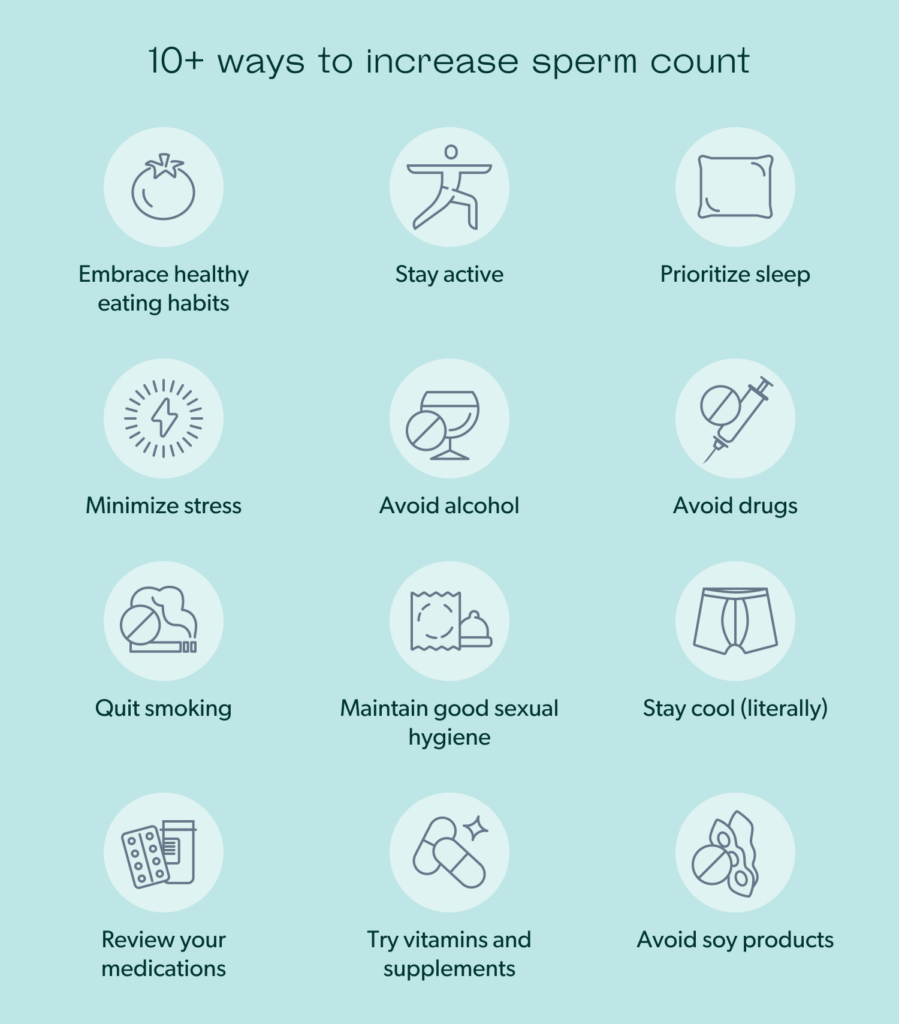10 Ways to Improve Male Fertility and Increase Sperm Count
All too often, infertility is thought of as a challenge that only women face – but this couldn’t be further from the truth!

In fact, research suggests that among those struggling to conceive, “male factor” infertility plays a role in an estimated 40-50% of cases. Another study published in 2022 reported that total sperm counts have dropped by 62.3% over the past 50 years.
In this article, we’ll cover everything you need to know about male fertility, including the significance of sperm count, the difference between sperm motility and morphology, and the basics of maintaining a healthy sperm count. We’ll also cover some of your most frequently asked questions about male fertility.
Ready? Let’s go!
What is sperm count?
Sperm count is the total number of sperm cells that are present in ejaculate (semen). According to the University of Rochester, a “normal” sperm count is at least 39 million sperm cells per ejaculate.
There are a number of different factors that can affect sperm count. This includes age, health history, certain medications, and lifestyle.
Understanding sperm count and male fertility
When it comes to fertility, the simple fact is that it takes both a sperm and an egg to get pregnant. And if sperm counts are low, the chances of conception are low too. This can be extremely frustrating for couples who are actively trying to plan a pregnancy.
Normal sperm count range
Sperm counts can be as low as 15 million per mL of semen to over 200+ million per mL of semen. Although thresholds may vary depending on the laboratory, it is widely accepted that if a sample has less than 15 million sperm per mL, this is considered to be “low”.
Sperm motility and morphology
It’s not just the number of sperm cells that matters. Sperm motility and morphology matter, too.
Sperm motility is how well a sperm can move or “swim” through the vagina and cervix. Sperm morphology on the other hand relates to the shape and size of sperm. Both factors can interfere with a sperm’s ability to reach and fertilize an egg, and both factors are influenced by age, lifestyle, and medical history.
The do’s and don’ts for a healthy sperm count
In terms of maintaining a healthy sperm count, there are some things that you can control in your day-to-day life. Here is a look at the do’s and don’ts along with strategies for boosting your sperm count naturally.
Do: maintain a balanced lifestyle
Lifestyle factors can have a huge impact on fertility, including sperm count. Leading a healthy lifestyle by eating plenty of nutrients, keeping stress levels under control, and maintaining a healthy weight can all boost male fertility.

Do not: ignore any symptoms
Nobody knows your body better than you do. If you experience any problems with ejaculation, or if you and your partner have been struggling to conceive for more than a year (or six months if over the age of 35), it’s recommended to speak with your doctor for further support.
Do: get tested
If you are actively trying to conceive (TTC), there is no shame in having your sperm tested either at your doctor’s office or with a modern at-home test kit. These tests can give insight into the quality and concentration levels of your sperm so that you and your partner can make informed decisions about your fertility.
10+ ways to increase sperm count
Embrace healthy eating habits
In general, what’s good for your body will be reflected in your sperm count. This means eating a well-rounded, nutrient-rich diet packed with fruits, vegetables, lean proteins, whole grains, and healthy fats (such as Omega-3 fatty acids).
For more tips on how to cultivate a sperm-friendly diet, check out our article The 7 Foods to Avoid For Healthy Sperm.

Stay active
Regular exercise is one of the best things you can do to increase fertility. Not only does it help to improve your overall health, but it also helps to regulate your weight and hormones.
In men, research shows that losing fat helps to lower the amount of testosterone converting to estrogen. In addition, men who exercise regularly were found in this study to have better semen quality compared to men with a more sedentary lifestyle.
Prioritize sleep
Quality rest and adequate sleep aren’t just vital for your overall health, they are vital for fertility, too! In fact, one research study has even found a link between sleep duration and semen quality. Most adults need around eight hours of sleep each night. If you are struggling to fall asleep and stay asleep, consider evaluating your routine and making positive changes where necessary.
Minimize stress
Stress can interfere with so many aspects of our health – including our appetite, weight, energy levels, sleep, and of course – sperm quality. This is backed up by a combined research study from Columbia University and Rutgers University, which found that psychological stress can be harmful to sperm.
If you find yourself feeling overwhelmed with your personal or professional life, consider letting go of some responsibilities, incorporating more time for yourself in your day-to-day life, and/or speaking with a counselor who can help you find effective ways to manage stress in your personal life.
Avoid alcohol
Too many drinks can lead to lower testosterone levels, which in turn impacts sperm count. According to the CDC, up to two drinks per day is considered “moderate” consumption for men and hasn’t been shown to have negative effects. However, if you are actively TTC, it may be best to take a break from alcohol to maximize your chances.
Avoid drugs
Male fertility can also be affected by taking drugs, illicit or otherwise. Drugs like cannabis, cocaine, and heroin reduce testosterone levels and sex drive. Not to mention that some prescription medications can have unintended side effects like fertility issues. Drugs and alcohol may have other short or long-term health effects but the research is clear that they can negatively impact fertility.
Quit smoking
Smoking and tobacco use are linked to a host of health conditions, including issues with fertility. The negative impacts on sperm production and movement are well-documented in research, with cigarette smoking, in particular, being associated with reduced sperm count and motility.
The chemicals in cigarettes can also seriously damage the DNA within the sperm cells and lead to decreased fertility. Your sperm can recover though and become healthier in just a few months if you stop smoking.
Maintain good sexual hygiene
Sexually transmitted infections (STIs) can lead to infertility if untreated. If you are not actively trying to conceive (TTC) but hope to do so in the future, protect yourself by wearing condoms and having regular check-ups with your doctor.
Stay cool (literally)
Research suggests that exposure to high-temperature environments can negatively affect sperm quality. While you may have limited control over your living and/or working conditions, there are a few things you can do to keep yourself cool. This includes wearing loose underwear, avoiding hot tubs and saunas, and avoiding exercises (such as cycling) that create a lot of heat while in a seated position.
Review your medications
There are a number of medications that are known to have a negative effect on fertility. The most common include certain anti-depressants, anti-inflammatories, and hormone-based medications.
If you are already taking a medication and looking to plan a pregnancy with your partner, it’s worth asking your doctor for a medication review. They may be able to prescribe an alternative – at least during the TTC process – that will have less of an impact on your fertility.
Try vitamins and supplements
Taking certain vitamins and supplements may also help to boost male fertility.
For example, low levels of folate (vitamin B9) have been associated with DNA damage in sperm and lower sperm counts. Folate can be taken as a supplement, or, it can also be found in leafy greens, citrus fruits, legumes, nuts, and whole grains.
Low zinc levels have also been shown to be a risk factor for low sperm quality. For men, the daily recommended dietary allowance is 11 mg per day. Dietary sources include oysters, red meat, poultry, beans, nuts, and fortified products.
It’s also worth mentioning Withania somnifera (Ashwagandha). This is a medicinal herb native to India, and research suggests that it may have a positive effect on sperm count and motility. It may also help to regulate hormone levels.
Avoid soy products
Soy products, such as soy milk, soybeans, tofu, and edamame contain phytoestrogens, which may have an effect on hormone levels in some. For example, one research study found an association between high soy product intake and low concentration of sperm among male participants.

How to increase sperm count naturally?
Unfortunately, there is no single food, supplement, or exercise that can magically improve your sperm count overnight. Everyone’s body is different, and what works for some individuals may not work for others.
However, in general, the best strategies for increasing your sperm count naturally include:
- Maintaining a balanced lifestyle that includes time for exercise, relaxation, and sleep.
- Eating a nutrient-rich diet for healthy weight management.
- Avoiding potentially harmful substances such as alcohol, drugs, tobacco, and soy products.
- Incorporating fertility-boosting vitamins and supplements into your diet.
If you are struggling to make the necessary lifestyle changes in order to improve your sperm count, it’s a good idea to seek additional help from your doctor. They can provide the best support and recommendations for your individual situation.
How to increase sperm count by food
When it comes to your diet, it’s important to eat nutrient-rich foods that nourish your body. This not only helps your hormones stay regulated, but it will also help you maintain a healthy weight.
According to the University of Chicago Medical Center, foods such as fruits, vegetables, fish, and walnuts may help to improve sperm health. In terms of what to avoid, doctors recommend reducing your intake of processed meats, trans fats, high-fat dairy products, and soy products.
FAQs
How long does it take to increase sperm count?
According to the Mayo Clinic, sperm can take up to 76 days to mature in the body. This means that positive lifestyle changes will begin to take effect within at least three months.
Are there any foods that can boost sperm count?
Nutrient-rich foods such as fruits, vegetables, lean proteins, and healthy fats can help to promote good overall health and fertility.
Can exercise improve sperm count and motility?
Yes. Regular exercise can help to regulate weight and hormones. However, men who are actively TTC are advised to limit exercises such as cycling which may have a negative effect on sperm quality.
What are the common signs of low sperm count?
The most common signs of low sperm count include:
- Low libido
- Dry orgasms
- Erectile dysfunction
- Changes in hair growth
- Pain around the testicles
- Foul-smelling semen
- Semen that is red, pink, or yellow in color
Another sign of low sperm count is the inability to get pregnant. If you have been actively trying to conceive for at least one year (or six months if your partner is over the age of 35) without any luck, it’s a good idea to speak with your doctor. They may recommend a sperm test and provide further advice on how to conceive.
Can medications affect sperm count?
Yes. There are a number of medications known to affect sperm count and male fertility.
A comprehensive list is available in a research study here – it’s also a good idea to speak with your doctor or pharmacist if you are concerned about any of your current medications.
Are there any alternative therapies for increasing sperm count?
In addition to maintaining a healthy weight, getting plenty of sleep, and managing stress, you can also try taking certain vitamins and supplements. For example, folate, zinc, and Withania somnifera (Ashwagandha) may help to boost sperm count. We recommended speaking with your doctor before starting a new supplement.
Does age affect sperm count and fertility?
Yes. Research shows that age has a significant impact on male fertility, with semen quality believed to be significantly reduced after the age of 55.
Mira’s Editorial Process
All content produced by Mira meets stringent editorial standards, ensuring excellence and accuracy in language and medical precision. Every piece undergoes thorough fact-checking and review by qualified professionals. Check out our full editorial process to learn more.




